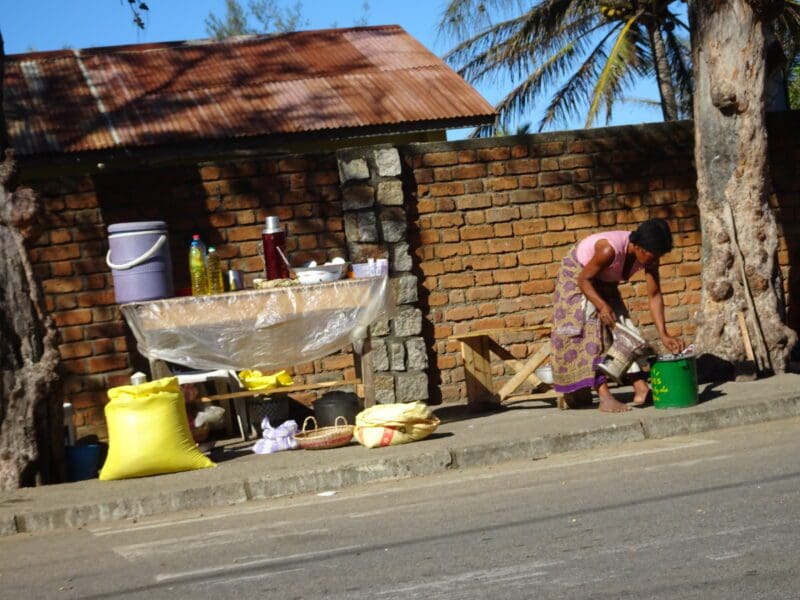Improve the health, environment, and economy of isolated communities
Lesson Learned:
Look for innovations that improve people’s lives in multiple ways; for example, saving people money while improving their health.
Nearly 3 billion people worldwide cook and heat their homes with solid biomass fuels like charcoal and wood.[1] Burning those fuels contributes to hazardous air pollution, which is responsible for over 7% of deaths globally.[2]
In Madagascar, 95% of households and small businesses use an open wood fire for cooking with a devastating impact on the environment and a disproportionate one on the health of women and children, who spend much of their days in the home.[3] 80% of the wood from Madagascar’s forests is used for firewood and, due to the high demand for wood, the forests are at risk of extinction.[4]
Association pour le Développement de l’Energie Solaire Suisse (ADES) works in Madagascar to provide a safer cooking method while also alleviating the extreme poverty of the communities they work in.
“My ADES cooker significantly reduces my expenses when buying coal and allows me to increase my income. I want to buy another bigger ADES cooker once I have saved enough in a few months.”
– Madame Soanalimbe’e, owner of a street restaurant in Fianarantsoa
“I started working with ADES in 2020. In the ADES training, we created a business plan together. To promote it, I made posts on social media, among other things. This year I was able to open a second shop and now I can also sell directly from the back of my car. With the profit, I pay my children’s school fees.”
– Madame Mialy, an ADES cookstove seller

What it does
ADES improves the health, environment, and local economy through a three-pronged approach: producing and distributing solar and fuel-efficient cookstoves, environmental education, and reforestation.
ADES designed its cookstoves through conversations with Malagasy households to ensure that the improved stoves are not just better for the environment, but also useful for the people who will use them. ADES offers two options: solar cookstoves and fuel-efficient cookstoves that reduce fuel consumption by 50% to 70%. Components of the cookstoves are sourced and manufactured in Madagascar whenever possible. The organization sells them for about 10% of their manufacturing cost, subsidizing the cost through philanthropic support and carbon credits.
In addition to reducing demand for wood fuel, ADES has planted 750,000 firewood, timber, and fruit trees since 2014, restoring 220 hectares of forest. ADES works with village leaders to determine a mix of trees that provide nutrition and value during reforestation.
ADES has distributed over 500,000 cookstoves and benefited 2.1 million people over the last 20 years. ADES also partners with Madagascar’s Ministry of Education, schools, and other educational organizations to teach more than 100,000 children, teachers, and parents about environmental issues and the impact of deforestation.
How effective it is
ADES estimates that its solar and fuel-efficient cookstoves have saved over 3 million tons of wood and prevented the emission of over 3 million tons of CO2. One cross-sectional comparative study found that households with improved cookstoves like the ones ADES manufactures were about 50% less likely to suffer from respiratory illness.[5]
Beyond their health and environmental impacts, ADES stoves save their owners money and create jobs. In Madagascar, people who burn charcoal can spend as much as 25% of their income on fuel. Using an ADES stove saves its owners at least 50% of the cost of fuel and saves time collecting firewood that they can use for income generation and other activities.[6]
The organization directly employs 250 people who receive health benefits and tuition fees for their children. ADES has also trained another 233 people as independent resellers, 70% of whom are women who live in rural villages with few job opportunities.
How philanthropy helps
ADES receives 40% of its funding from philanthropic sources, with the remaining 60% from carbon credits and the sale of its cookstoves. Philanthropic funds subsidize the costs of cookstoves (about $50 to produce and $5 to sell), reforestation efforts, and education programs. Learn more at https://ades-solaire.org/en/.
More ways to help
Other organizations working to improve health in rural communities included CDD India, which builds environmentally sound sanitation systems in rural communities, and Project ECHO, which provide high-quality medical care to under-served, isolated communities.
For more CHIP guidance on health interventions and organizations working to lessen health disparities, see CHIP’s Community-Based Approaches to Health guide. For more ways to improve the lives of women and girls, visit CHIP’s The XX Factor, a framework and guidebook with strategies and case studies
Notes
[1] World Health Organization. (2022, November 28). Household air pollution. https://www.who.int/news-room/fact-sheets/detail/household-air-pollution-and-health
[2] World Health Organization. (2022). Household air pollution data. https://www.who.int/data/gho/data/themes/air-pollution/household-air-pollution#:~:text=The%20importance%20of%20household%20air,7.7%25%20of%20the%20global%20mortality.
[3] Nowshin, I., Akber, E., & Munmun, U. D. (2021). Improved and Traditional Biofuel Cookstoves and Respiratory Symptoms among Women in Bangladesh: A Comparative Study. Mymensingh Medical Journal: MMJ, 30(1), 128–134.
[4] Goodman, S. M. (2022). Updated estimates of biotic diversity and endemism for Madagascar—Revisited after 20 years. Oryx, 1–5. https://doi.org/10.1017/S0030605322001284
[5] Nowshin, I., Akber, E., & Munmun, U. D. (2021). Improved and Traditional Biofuel Cookstoves and Respiratory Symptoms among Women in Bangladesh: A Comparative Study. Mymensingh Medical Journal: MMJ, 30(1), 128–134.
[6] US EPA, O. (2014, September 15). Household Energy and Clean Air [Overviews and Factsheets]. https://www.epa.gov/indoor-air-quality-iaq/household-energy-and-clean-air
